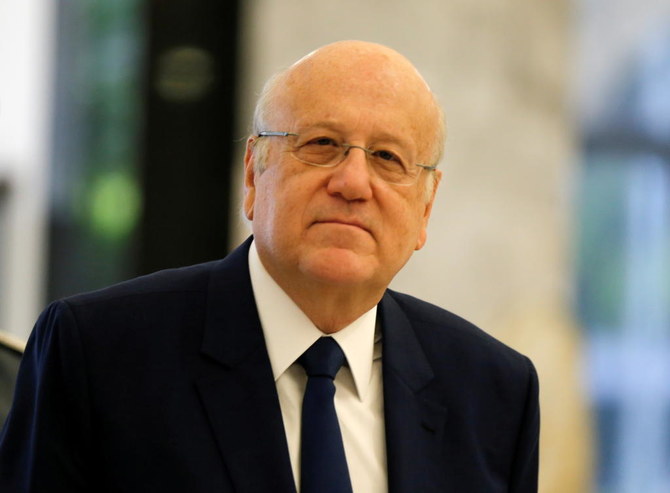BEIRUT: The Lebanese government will resume negotiations with the International Monetary Fund while beginning reforms demanded by donors, according to a draft policy program that aims to tackle one of the worst financial meltdowns in history.
New Prime Minister Najib Mikati’s government will also resume negotiations with creditors over a restructuring of public debt on which Lebanon defaulted last year, the draft seen by Reuters on Wednesday said.
The government was agreed on Friday after more than a year of political conflict over seats in cabinet that left the country rudderless as more than three-quarters of the population fell into poverty and shortages crippled normal life.
The cabinet is due to meet on Thursday to approve the draft, which will then go to a vote of confidence in parliament.
Underscoring the gravity of the situation, the policy program was drawn up in a matter of days, much faster than the weeks the process has taken in the past.
The draft said the government was committed to resuming talks with the IMF for a short- and medium-term support plan.
Donors want to see Lebanon enact reforms, including measures to tackle the corruption and graft that led to the economic collapse, before they will unlock billions of dollars of assistance already earmarked for the country.
Talks with the IMF broke down last summer when Lebanon’s political elite and banking sector objected to the scale of financial losses set out in a recovery plan drawn up by the previous government.
The draft program said the Mikati government would renew and develop the previous financial recovery plan, which set out a shortfall in the financial system of some $90 billion — a figure endorsed by the IMF.
The government will also draw up a plan to “correct the situation of (the) banking sector,” which has been paralyzed since late 2019, the draft said.
Lebanon’s financial system unraveled in late 2019.
The root cause was decades of profligate spending by the state and the unsustainable way in which it was financed.
As dollars dried up, depositors were frozen out of their accounts. The value of hard currency savings has plummeted by up to 80 percent since then, with the Lebanese pound collapsing by 90 percent from a peg that had existed for more than two decades.
The program draft said the government was committed to all the articles set out in a reform initiative drawn up by France, which has been at the forefront of efforts to help Lebanon.
The government will work with parliament to pass a capital control law, the draft document said.
It also said parliamentary elections due next spring would be held on time.
Lebanon to resume IMF talks, begin reforms, draft policy statement says
https://arab.news/ve2q8
Lebanon to resume IMF talks, begin reforms, draft policy statement says

- New government will also resume negotiations with creditors over a restructuring of public debt
- The draft said the government was committed to resuming talks with the IMF for a short- and medium-term support plan
Jordan condemns US ambassador remarks on accepting Israel’s West Bank annexation

- The Jordanian Ministry of Foreign Affairs said it rejects the ambassador’s “absurd and provocative statements”
CAIRO: Jordan condemned Saturday earlier remarks by US envoy to Israel Mike Huckabee, who said it would be acceptable if Israel took control of the entire Middle East, including the West Bank.
Huckabee has suggested that he would not object if Israel were to take most of the Middle East.
The Jordanian Ministry of Foreign Affairs said it rejects the ambassador’s “absurd and provocative statements,” in a statement published on Petra News Agency.
Ministry spokesman Fouad Majali said the remarks “constitute a violation of diplomatic norms, an infringement on the sovereignty of the region's countries, a blatant breach of international law and the UN Charter.”
Majali also said they contradict diplomatic efforts by the United States and the declared position of US President Donald Trump in rejecting the annexation of the occupied West Bank.
The spokesperson reaffirmed that the West Bank, including East Jerusalem and the Gaza Strip are occupied Palestinian territories under international law, and that ending Israel’s occupation is a must for the establishment of an independent Palestinian state on all of the occupied Palestinian territory, based on the two-state solution.














